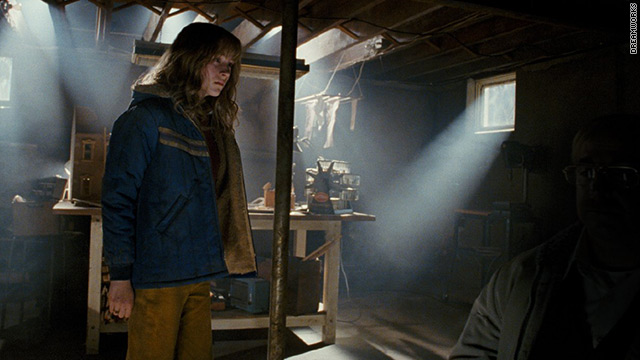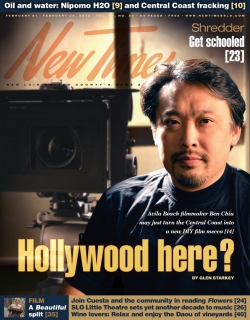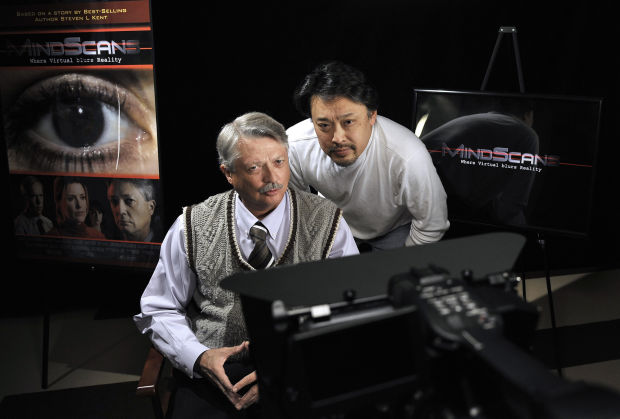This clip is amazing–in content and craft. See if you can find the edits and FX shots.
Category: Production
Information and discussions about Movie Production
How ‘Ebert’ are you?

Movie quiz: Learn how your taste in movies compares with Ebert’s, based on his reviews. Click through these 10 films and rate them — either “thumbs up” or “thumbs down.”…
I’ve always found myself more often agreeing more with Roger Ebert than not, but for me the best part of watching/reading/listening to him was when I did disagree with him, his insight/point(s) were so valid that I’d often find myself being swayed to his side. I’ve said it before, his loss is great, but even more because there’s no one with his talent to fill his shoes. Take the quiz below and see how your opinions compare.
https://www.cnn.com/interactive/2014/12/specials/quiz-life-itself-ebert/
Your brain on movies: Why films make us cry, flinch and cheer

How are filmmakers able to push our buttons?
One way that we perceive emotion in film is through I process I call the Mirror Rule, which says that it’s a good idea to mimic the visual input that you’re seeing. So if you walk up to somebody and they smile at you, it’s good to smile back.
If you watch somebody in the theater and there’s a smiling face filling the screen, most of the audience is going to pop a little bit of a smile.
When we’re smiling, we tend to feel happier. When we’re frowning, we tend to feel angrier. So that combination of the Mirror Rule and the reading of emotion by the brain off the current state of the body is enough to produce emotion.
In film, a filmmaker has the opportunity to integrate those things very tightly. He can control exactly what’s shown of the face and what else is present. And the viewer has much less opportunity to walk away or focus on other things…
While I feel that movies are one of the most power things man has ever created (it can educate, inspire and change lives for good… or bad–witness war propaganda films), most people don’t realize how manipulative they really are. The abuse of the art has always been something that makes my blood boil. What is that saying? “With great power comes great responsibility.” ~Uncle Ben
https://www.today.com/health/your-brain-movies-why-films-make-us-cry-flinch-cheer-1D80258284
88 CINEMATOGRAPHERS SHARE THE BEST PROFESSIONAL ADVICE THEY’VE EVER RECEIVED

88 cinematographers and ASC members reveal thoughts, advice, tips, and tricks they’ve received that helped them throughout their professional careers. Their responses range from the simple to the complex, the obvious to the specific, and the easy to the hard – but all of them stand to help you make the most of life in the film industry…
The ones I’ve heard over the years that still stick with me today are:
‘Show up early, don’t sit down, and act like you give a shit.’
‘If you’re not 10 minutes early, you’re 10 minutes late.’
https://www.theblackandblue.com/2013/12/16/88-cinematographers-advice/
Movie Theater Ticket Prices Could Reach $150, Says George Lucas

…Spielberg said studios were increasingly putting money into “mega-budget” movies, causing a tectonic shift in the entertainment industry.
“There’s eventually going to be an implosion, or a big meltdown,” Spielberg said. “There’s going to be an implosion where three or four, or maybe even a half-dozen mega-budget movies, are going to go crashing into the ground, and that’s going to change the paradigm.”…
I’ve been saying this for years. Now I’m not happy that my comments are coming true, but the idea that movies can continue to be made without a real chance of making a profit or at least making your money back have been a staple of the naive, but to a very great extent a kind of inside joke among the studios and major players. You’d just move on to another project and find some other suckers… erm, investors to finance your next movie.
Paying people huge amounts of money up front for a movie that nets a loss is crazy. On a related note, I truly hope that corporate America can learn the same lessons here or the same things will continue to happen.
What do you think?
https://gma.yahoo.com/blogs/abc-blogs/movie-theater-ticket-prices-could-reach-150-says-155727572.html
Ben In the Media



+https://www.ksby.com/videos/local-spotlight-mindscans-/
+ https://www.newtimesslo.com/cover/9088/the-democratization-of-filmmaking/
+ https://santamariatimes.com/news/local/central-coast-ideal-place-for-film-studio-to-flourish/article_b594d6d4-7e52-11e2-8ed2-001a4bcf887a.html
+ https://mindscans.com/press/journalplus.pdf
+ https://www.sanluisobispo.com/2013/02/21/2401719/locally-produced-film-mindscans.html
+ https://www.cuestonian.com/mindscans-premieres-cuesta-students-star-in-local-movie/
+ https://www.atascaderonews.com/v2_news_articles.php?heading=0&page=72&story_id=5969
+ https://www.atascaderonews.com/v2_news_articles.php?heading=0&story_id=5995&page=72
Just the FAQ’s ma’am
There have been so many inquiries about studio opportunities recently that in an effort to reduce disappointment and at the same time better your chances of joining our Motion Picture Group, I put together this list of Frequently Asked Questions. I will add questions and answers as they become necessary
1. I want to audition for your next production, how do I do that?
(SAG/AFTRA, unless you’re “SAG core,” you can stop reading here. We only make non-union productions.)
While we’re interested in helping actors to be the best they can be, we are not able to help people who are “thinking about becoming an actor,” “wanting to try out acting,” because their “mom/aunt/cousin thinks I’d be a good actor.” If you’re not already acting and have a passion for it (can’t live without constantly acting in something or other), please don’t waste your time. If you have no acting credits, the chances of us using you in a production other than as an extra is virtually zero. The bottom line is you’d be too far behind the curve to work with efficiently–and efficiency is the name of the game.
If you have no experience acting and are driven to act in movies, attending acting classes and getting experience acting before contacting us is the path. But beware, screen acting classes that don’t use a camera all of the time are a waste of time and money. (Sounds silly now that it’s been put that way, right?)
Please send an email to “casting @ alliancedigitalstudios.com” to receive information on how to submit your headshot and resume’.
2. I want to crew/help behind the scenes. I’ll work for free and I have equipment. Just give me a chance. How do I work for you?
First, thank you so much for volunteering to help the effort. We all really appreciate it! (Please note that we are not looking for free help–everyone is paid on a deferred-pay basis.) However, as you might surmise from MindScans, we don’t need help behind the camera or equipment to make quality movies. That said, the key to efficiency is having less, not more, behind the camera. Our philosophy is expenses that do not show up on screen are a waste. Please see #5.
3. I have this great idea/story/plot/screenplay that you should make into a movie. How do I get a private meeting with you?
Again, while I appreciate the sentiments, we have far too many projects already in the works that make business sense to produce that it’d be a waste of time to send them or tell them to me. We struggled with this at Paramount and our policy is the same. Unless you have a studio qualified agent submit your idea/screenplay/etc., please do not waste your time. Even then, it probably won’t meet our criteria either. What we’re doing is very different than what others have done or are doing.
And on that note, do I really need to say that being more aggressive will NOT help your cause? If your work really is fantastic, please get an agent.
If you are a passionate writer and want to pursue screenwriting, read and learn anything from Robert McKee. Our criteria for story come directly from Mr. McKee. Solid narrative structure is the minimum criteria basis for everything at Alliance.
4. I want to talk to you to help me build my production company/make my movie/get distribution for my movie/etc.. Why won’t you help me?
The short answer is I’m doing all I can to help make Alliance profitable. And if you’ve done your homework, you’ll already know that I pretty much do everything now, so I hope you can appreciate that my time is very limited.
That said, and I’ll try and put this as diplomatically as possible; just like with fine furniture, diamonds or wine, while you can enjoy these things as they are, you really don’t know what makes one piece better than the next unless someone points out why this is better or not so good. With all art, this is a major problem. Just because you watch a lot of movies or read everything you can about making movies on the internet doesn’t mean you can make marketable movies or even know what would be marketable. You may think what you have is great, but it most likely will not be based on accepted industry criteria or in our case, our criteria–if it were, you wouldn’t need us. And I hate to say this, but unless you have experience in the industry or at least gone to a good film school, you’re probably too far behind the curve for me to help you enough to make a difference. Please see #5.
5. Wait, I thought you’re building a mini-industry here on the central coast! Aren’t you going to help the existing local film makers?
Make no mistake, our goal is to build a mini-movie industry here. However, our success (as limited as it has been) is directly due to careful design and planning. I can’t take someone else’s project and make it into an Alliance Digital Studios production. In order to do what we do, it has to start from concept all the way to distribution and be done our way. Everything matters. Unless the project fits everything from our philosophy and quality standards exactly, we can’t make it profitable. Every piece, every step, every last detail is important.
Movies are so complex that it’d be impossible to list everything for people to follow. So how do we plan on reaching my goal?
Well, we’ll continue making movies just as we did with MindScans. The plan is to make many movies here on the central coast, and I know I can’t make all of them (and I don’t want to). I want to train people to do what I do so we can make more than one Alliance Digital Studios movie at a time, with me taking a less hands-on role. Just like at any studio, projects will be green-lighted and I’ll guide productions as studio chief and ex prod.
I know there are many out there who will jump at this and think they can get started right away on their own Alliance Digital production. As I explained earlier, it can’t work like that. Development and pre-production are critical to success. And even with a film school degree, from my experience, I’d lay odds that you probably don’t even know how much you don’t know. So please trust me on this.
These facts were the way it was when I worked in Hollywood and they remain today. I think the only real differences between what we’re doing and what’s done in Hollywood today are with us: Story is king again. Quality entertainment is the goal. Efficiency increases profit, and everyone shares in success. This describes the Alliance Digital Studios way.
What we can offer is on-the-job training for various crafts, but just as it took me years to learn how to make a movie start to finish, it’ll take you the same amount of time as it took me. If you are easy to work with, dedicated, reliable, and have a passion for movie making, then we want to hear from you.
Best of luck to you in your pursuits!
-Ben
Video Essay: Kubrick & One-Point Perspective
My Job As a Director Is to Look At It From the Outside
I’d run across the following clip recently (and it looks like an excellent doc for filmmakers working today) and it triggered memories of discussions with (mostly new, but not always) talent over the years.
There comes a point in an actor’s journey when they realize what their job is in the whole grand scheme of the machine or they begin to question/explore what it could be (contradicting the whole “moment” concept to some extent). The reasons vary from not trusting the director to actors thinking they know more than they do or think they can do more than most humans without compromising their performances.
Side By Side Interview – David Fincher (2012)
So who is right? It depends on who can recognize the right performance required for the scene as it relates to the story and ultimately movie. Ideally, everyone in the production should be able to do this (be happy if everyone in the scene gets it), but that’s very rare and when it does, it’s usually over the top or cliche’. Be careful! Make choices that are justifiable on as many levels as possible and you’ll usually be on the right track.
If someone’s justification doesn’t exist or is based on external (non-movie related) reasoning, hopefully they’ll realize what they’re saying is not best for the production and you can move on.
https://www.youtube.com/watch?v=BdOiq1m0qNk&feature=player_embedded
There’s passion, and there is PASSION!!
I’ve been writing a blog installment on this very subject and ran into this interview with Annie Lennox (I’m a big fan of her talent and drive). And wouldn’t you know it? Guess what she talks about?
More on this soon.
https://www.youtube.com/watch?v=bjiuXdzzeEk&feature=relmfu
